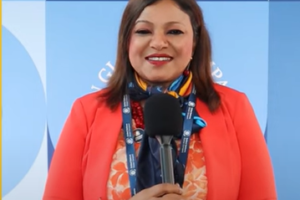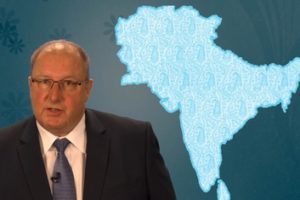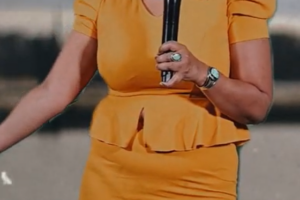A Ukrainian comedian who plays an accidental president on television delivered a walloping rebuke to the country’s political class in the presidential election Sunday by emerging first in a crowded field of candidates, exit polls indicated.
The comedian, Volodymyr Zelensky, 41, captured more than 30 percent of the vote, according to two authoritative exit polls. It was a strong showing by a maverick with no political experience, though far below the 50 percent needed to win the first round outright.
If exit polls translate into real votes, Zelensky will face President Petro O. Poroshenko, who emerged second with around 18 percent, in a runoff in three weeks, on Apr 21. Yulia V Tymoshenko, a former prime minister making her third bid for the presidency, was third with about 13 percent.
Official results are not due until Monday, and there will most likely be challenges, but the exit polls all reflected roughly the same results predicted by surveys before the vote. Turnout was estimated at about 63 percent in an electorate of 30 million people, slightly ahead of the 60 percent who voted in 2014.
After the polls closed, Zelensky and Poroshenko lost no time in attacking each other.
“I want to thank all Ukrainians who voted today not just for kicks,” said Zelensky, taking a dig at Poroshenko for saying the incumbent alone should be taken seriously. “This is only the first step toward a great victory.”
Poroshenko said that the time for jokes was over and that Zelensky would make just the kind of weak president sought by President Vladimir Putin of Russia, the bogeyman of Ukrainian politics.
“He dreams of a soft, submissive, gentle, giggling, inexperienced, weak, ideologically amorphous and politically uncertain president,” Poroshenko said. “Will we gift him this?”
Poroshenko, a chocolate tycoon who is among the richest men in a country dominated by oligarchs, appeared to offer a tacit admission that younger voters had abandoned him in droves. He said he had heard — and understood — their desire for a faster pace of change.
It was a stunning result in an election that will help to determine the future of a country that has become the European front line in a new era of confrontation between Russia and the West. The grinding war it has spawned has left 13,000 dead and displaced millions since 2014.
The fact that Ukraine works as a real democracy, albeit a troubled one, is often cited as perhaps the most important aspect of the election. Unlike the Potemkin elections in neighboring Russia and Belarus, the contest in Ukraine offered voters a real choice, with the outcome unknown.
A STANDOUT IN A FIELD OF 39 CANDIDATES
In a crowded field of candidates, most of them politicians, Zelensky stood out as the star of a popular television series in which he plays a schoolteacher who is unexpectedly propelled into the presidency after his anti-corruption tirade goes viral.
“He is doing well because there is a widespread mood in Ukraine of alienation from politicians and the political class, which is not unique to Ukraine,” said Robert Brinkley, a former British ambassador to Ukraine who is now chairman of the Ukrainian Institute in London, an educational and cultural centre.
In southern Kiev, Artem Nechyporuk, 26, a computer programmer, emerged from a polling station on what was the first warm day of spring to say that he supported Zelensky.
“He is the only candidate who is not contaminated with our politics,” he said. “That is why he is the only candidate for me.”
FRESH-FACE, BUT TIES TO AN OlIGARCH
The basic knock on politics in Ukraine is that ever since the country declared its independence from the Soviet Union in 1991, it has been run by a government of oligarchs for oligarchs. Despite anti-government uprisings in 2004 and 2014, the country’s fundamental character remains unchanged.
Avenues for the abuse of government contracts and other corruption have been reduced but not eliminated, and the stigma of graft dogs the entourage around Poroshenko.
Ukrainians seem more fed up than ever. A mere 9 percent say they have confidence in the government, and 91 percent see it as corrupt, according to a Gallup poll conducted in March.
That gave rise to Zelensky, who has blurred the lines between his television character and his candidacy. His show, “The Servant of the People,” became the name of his party. Many voters say they feel as if they know him after watching him on television for years, similar to what many Americans say about President Donald Trump.
Despite his fresh-face appeal, however, questions hang over Zelensky.
Some wonder if he may be a surrogate for Ihor V. Kolomoisky, an oligarch and bitter rival of Poroshenko who moved to Israel after becoming embroiled in a banking scandal that cost Ukraine $5.6 billion. Although Zelensky has been a business partner with the oligarch through television and announced his candidacy on Kolomoisky’s channel, both men have denied any covert link.
THE CAMPAIGNERS
The electorate’s main concerns are issues like raising wages and unemployment, as well as the war in eastern Ukraine. No candidate has offered a detailed blueprint to solve those issues.
Poroshenko, 53, has wrapped himself in the flag, campaigning under the slogan “Army, Language, Faith.” His campaign emphasised that he had restructured the army to strengthen it in its confrontation with Russia and had pulled the Orthodox Church in Ukraine out of Moscow’s orbit.
“I am voting for Poroshenko because he has already demonstrated his ability to do things, not just words,” Nataliia Pavlik, 72, said after voting in Kiev on Sunday. She cited the ability to travel in Europe without a visa, church autonomy and the army as important considerations.
“He raised it from the ashes,” Pavlik said. “I want him to anchor all of this for the next five years.”






















